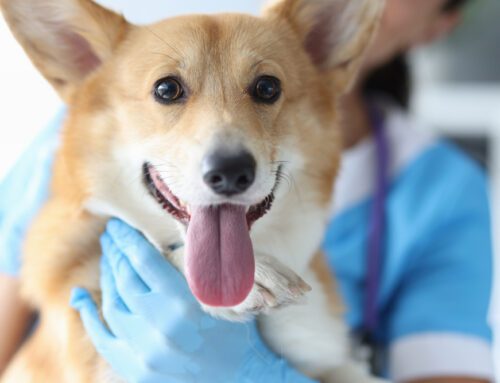Routine wellness exams help detect emerging health problems in apparently healthy pets, allowing intervention before the condition progresses to advanced stages. Studies have demonstrated the importance of these screenings for a pet’s wellbeing, yet many pets see a veterinarian only when they are sick or injured. Our team at Village Animal Hospital wants to explain why these veterinary visits are essential to ensure your pet remains happy and healthy.
Your pet’s wellness physical examination
Our gold-standard wellness screening starts with a comprehensive physical examination. Your four-legged friend is evaluated from their wet nose to the tip of their furry tail. Areas covered include:
- Weight — We will weigh your pet and assess their body conditioning score to determine their status. Obesity is a common problem for pets that leads to serious health conditions, such as cancer, diabetes, kidney disease, and arthritis. If your pet should lose a few extra pounds, we will devise a safe weight loss plan, and can also advise you on keeping your healthy-weight pet slim and trim.
- Temperature — Normal body temperature for a pet is between 101 and 102.5 degrees, and deviations can indicate conditions such as infection or inflammation.
- Eyes — Conditions such as cataracts and glaucoma can affect your pet’s vision. We will carefully examine your pet’s eyes to ensure their cornea, lens, retina, and optic disc are healthy.
- Ears — Ear problems, such as infections, parasites, and polyps, commonly affect pets, and we will ensure your pet’s ears are healthy.
- Mouth — Most pets have some degree of dental disease by the time they reach 3 years of age. This condition can lead to serious consequences, such as loose, painful teeth, oral abscesses, and missing teeth, plus your pet’s organs can be damaged if the bacteria enter their bloodstream. If we determine your pet has dental disease, we may recommend a professional veterinary dental cleaning to improve their oral health.
- Lymph nodes — Enlarged lymph nodes can indicate underlying health issues, such as infection or cancer. We will carefully palpate your pet’s lymph nodes to ensure they are normal size.
- Skin — Skin problems can indicate many health issues, such as allergies, endocrine disease, and parasites. We will evaluate your pet’s skin and coat to determine whether further diagnostics are needed.
- Chest — We will carefully auscultate your pet’s heart and lungs to ensure they don’t have a murmur, heart arrhythmia, or abnormal lung sounds.
- Abdomen — By gently palpating your pet’s abdomen, our veterinary professionals can determine if your pet has an abdominal tumor, or abnormally sized abdominal organs.
- Limbs and joints — We will assess your pet’s gait and palpate their limbs and joints to ensure they aren’t lame or suffering from joint pain.
- Spine — We will evaluate your pet to ensure they have no spinal abnormalities.
Your pet’s wellness bloodwork
Studies have demonstrated that screening blood work uncovers health conditions in one in seven adult pets, one in five senior pets, and two in five geriatric pets. Regular blood work also establishes a database for your pet, and lets our veterinary professionals track trends in their results. Blood work commonly performed at a wellness exam includes:
- Complete blood count (CBC) — A CBC evaluates your pet’s white blood cell count, red blood cell count, and platelet count. Abnormalities can indicate conditions such as infection, leukemia, and anemia.
- Biochemistry profile — A biochemistry profile evaluates several of your pet’s health aspects, and any abnormalities can indicate conditions such as kidney disease, liver disease, and diabetes.
- Thyroid panel — We may recommend a thyroid panel for senior pets, who are at higher risk for thyroid disease.
Your pet’s wellness urinalysis
Urinalysis assesses your pet’s kidneys and urinary tract and can diagnose metabolic disease, such as diabetes. A urinalysis tests for several factors, including:
- Color and cloudiness — Normal urine is pale yellow and clear. Dark urine typically indicates dehydration, and clear urine suggests your pet may be drinking and urinating frequently. Urine any color other than yellow can indicate an underlying disease process and should be investigated. Cloudiness can indicate substances, such as inflammatory cells, crystals, mucous, blood, or debris, are present.
- Concentration — The kidneys maintain the body’s water balance, and the urine may be diluted if too much water is present, or too concentrated if too little water is present.
- Urine pH — The pH measures the urine’s acidity or alkalinity. Abnormalities can indicate issues such as infection or metabolic disease.
- Chemical analysis — A chemical analysis measures substances such as protein, glucose, ketones, blood, and bile components. Abnormalities can indicate conditions such as kidney disease, diabetes, urinary tract infection, and liver disease.
- Cytology — The urine is examined microscopically to detect bacteria, crystals, and certain tissue cells.
Your pet’s wellness fecal check

Your pet’s feces are examined for intestinal parasites (i.e., hookworms, roundworms, whipworms, coccidia, and giardia) that can cause health problems for your pet. Your pet should be protected against these parasites with year-round parasite prevention medication.
A veterinary professional should evaluate your pet at least once a year, and then every six months once they reach 7 years of age. If you would like to schedule a wellness screening for your pet, contact our American Animal Hospital Association (AAHA)-accredited team at Village Animal Hospital, so we can ensure they have a clean bill of health.








Leave A Comment